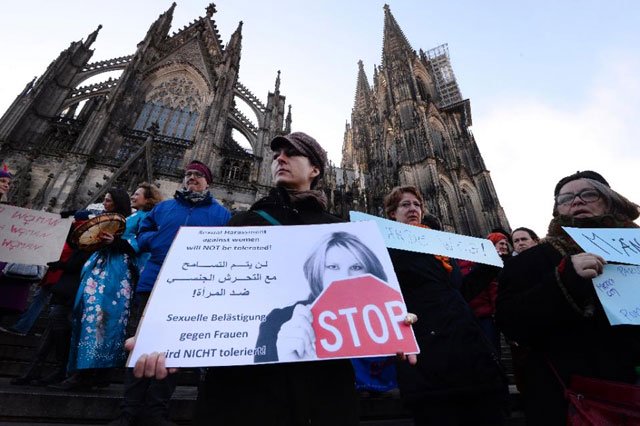
Both women's groups and supporters of the xenophobic PEGIDA movement mobilised in separate rallies in Cologne, as Merkel declared that refugees found to have committed a crime -- even those who have not been given jail terms -- should be required to leave Germany.
"If the law does not suffice, then the law must be changed" she said, vowing action to protect not just German citizens, but innocent refugees too.
Outrage is growing in Germany over the revelations that hundreds of women ran a gauntlet of groping hands, lewd insults and robberies in mob violence last week in the western city.
Most of the assailants were of Arabic or North African background, according to eye-witnesses, police and media reports.
'Cologne changes everything'
The majority of suspects identified by federal police are also migrants, adding fuel to criticism of Merkel's liberal migrant policy -- which brought 1.1 million new asylum seekers to Germany last year.
German police investigating mass sexual assaults during New Year's Eve
Waving German flags and signs meaning "Rapefugees not welcome", "Germany survived war, plague and cholera, but Merkel?", hundreds of PEGIDA supporters shouted "Merkel raus" (Merkel out).
In response, counter-protesters, separated by police, chanted "Nazis raus" at the site, where earlier, some 500 protesters, mostly women, had held a noisy rally against sexist violence.
Suspects include asylum seekers
Banging pots and blowing whistles, demonstrators waved signs in German meaning "No violence against women" and "No means no! It's the law!" while others read: "Protect our women and children."
Ahead of the afternoon rally, Lutz Bachmann, co-founder of PEGIDA ("Patriotic Europeans Against the Islamisation of the Occident") posted a photo of himself online wearing a t-shirt saying "Rapefugees not Welcome".
In a similar vein, the populist right-wing Alternative for Germany party, which polls show as having 10 percent support ahead of state elections this year, claimed the violence gave a "taste of the looming collapse of culture and civilisation".
The mob violence has played into popular fears, and threatened to cloud what had been a broadly welcoming mood in Germany where crowds cheered as Syrian refugees arrived by train in September.
'Do this for us'
Germany's conservative Die Welt newspaper said January 6, the day the scope of the violence became clear, "marks the beginning of a change in immigration policy" in an article outlining both "the benefits and the dangers of mass immigration from Muslim countries."
"Cologne has changed everything, people now are doubting," said Volker Bouffier, vice president of Merkel's CDU party at a meeting late on Friday.
Details of what happened in the frenzied crush remain hazy.
Germany's federal police have identified 32 suspects, 22 of whom are asylum seekers, in connection with 76 offences, 12 of which had a sexual character, the interior ministry said Friday.
Cologne police, which has around 100 investigators scanning some 350 hours of video, says it has identified 16 suspects.
It was unclear how many of the suspects were veteran migrants or belonged to a scene of drug dealers and pickpockets known to lurk around the railway station, and how many were newly-arrived asylum seekers.
On Friday, criticism over the police's failure to stop the violence claimed the scalp of Cologne police chief Wolfgang Albers in a bid to "restore public confidence".
Cologne police were slow to reveal the extent of the violence -- and the politically-charged fact that many in the hostile crowd were migrants.
Critics have also accused the media of seeking to cover up the incident in a bid to be "politically correct".
Merkel, who has so far refused to abandon her welcoming stance towards refugees, on Saturday had tough words for law-breakers.
Even those given suspended sentences should be required to leave Germany, she said.
German broadcaster sorry for slow reporting on mob assaults
"If a refugee flouts the rules, then there must be consequences, that means that they can lose their residence right here regardless of whether they have a suspended sentence or a prison sentence," she said after a meeting with the top ranks of her CDU party.
Under current laws, asylum seekers are only deported if they have been sentenced to jail terms of at least three years, and if their lives are not at risk in their countries of origin.
"We must do this for us, and for the many refugees who were not part of the events in Cologne," she said.




1714558558-0/It-Ends-With-Us-(1)1714558558-0-165x106.webp)
1734859792-1/Express-Tribune-(4)1734859792-1-270x192.webp)

1734855746-0/Untitled-design-(58)1734855746-0-270x192.webp)
1734856186-0/Untitled-design-(98)1734856186-0-270x192.webp)
1734853481-0/Untitled-design-(57)1734853481-0-270x192.webp)













COMMENTS (4)
Comments are moderated and generally will be posted if they are on-topic and not abusive.
For more information, please see our Comments FAQ